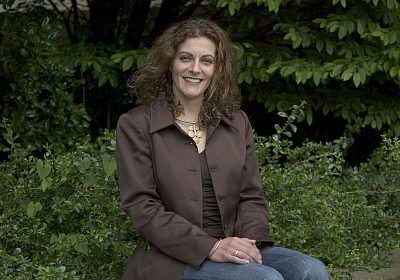June 2, 2005
Amity Neumeister: Working for access to care here and education
Health care was the primary issue on the minds of Washington state voters, according to a poll last January by the Working for Health Coalition. It’s also the primary issue on Amity Neumeister’s mind.
Neumeister is director of clinical systems development in the Office of Medical Affairs. She also co-organizes the Working for Health Coalition, an educational initiative comprising more than 30 organizations, with Dr. Bob Crittenden, chief of the Family Medicine Service at Harborview Medical Center.
Access to health care in Washington state has declined significantly in recent years, in large part due to budget shortfalls and program cuts. According to the Working for Health Coalition, more than half a million Washingtonians were uninsured in 2002. This number has grown each year since then; however, Neumeister is working to combat this trend so that more people have access to affordable health care.
“I think it’s a basic right we all deserve,” Neumeister said. “It’s something we obviously all need. If you’re having major health issues it’s hard to maintain a job, and if you can’t keep your job, you’re going to have a difficult time paying for health care. It’s a cyclical problem that can go downhill quickly if you don’t have access to health care.”
Neumeister was introduced to the health care industry at an early age.
“My stepmother used to work in health care and I grew up helping her in the office,” Neumeister said, “so when it was time for me to look for a job, I naturally sought out health care.”
After earning her MBA at the UW, she thought she might leave the health care field, but found she couldn’t stay away from it.
“I ended up only applying for jobs in health care,” Neumeister said, “I think for me, there is a definite draw to the industry.”
For Neumeister, that draw is the feeling that comes from helping others.
“Knowing that I’m helping people get access to care, that’s pretty fulfilling,” Neumeister said. “And it is also good just raising people’s awareness about the state of health care right now. It’s great to have the opportunity to educate others.”
Education also runs in Neumeister’s family. In 2002, her father and stepmother started Friends of Kenya Schools and Wildlife (FKSW), a non-profit organization that assists rural communities in Kenya to improve the educational opportunities for their children and to promote the preservation of wild animals. FKSW currently sponsors five primary schools in Kenya.
The idea for FKSW came when Neumeister’s parents went on safari in 2002 and visited a few schools along the way. Neumeister’s stepmother is a longtime educator at the University of Oregon. “When she saw the children there and the state of the schools, she felt really compelled to help,” Neumeister said.
Last January, Neumeister and a group of five other volunteers went to Kenya for three and a half weeks to volunteer for FKSW. The group brought supplies and toys to each school and even started construction on one.
“In Kachuru, we started building a new school for the village,” Neumeister said. “We brought them school supplies and toys, and then basically started digging—we cleared the ground for the foundation and put in corner posts. We left supplies for the people to finish the construction, and when FKSW goes back in July, they’ll check on the progress of the construction. It was a great trip.”
Neumeister found the communities she visited very welcoming. She could tell that the kids and the villagers were genuinely grateful for the efforts of the FKSW volunteers.
“In each town, everybody came out and watched us pass out the materials and school supplies we were giving them. We brought biscuits, juice, bubbles and balloons for the kids to play with,” Neumeister said. “It was neat. Everybody watched and participated.”
The population of each community was no more than 1,000, according to Neumeister, and each school had between 50 and 100 kids. There are about six kids at each desk “if they’re lucky enough to have desks,” Neumeister said. FKSW brought new desks for several of the schools.
FKSW also works to provide scholarships for students and salaries for teachers. Tuition costs $40 a year, which pays for books and a uniform. FKSW sponsors four to six kids in each school.
“The government is supposed to fund these schools but unfortunately a lot of the money oftentimes never gets to the schools,” Neumeister said.
Neumeister estimates FKSW has raised more than $10,000 so far. Her parents go to Kenya once or twice a year for about three weeks, and are hoping to move there after retirement, Neumeister said. Beginning last year, volunteers have also come to visit all the schools and to take them materials and supplies, help with construction, and help the school plan for the next year.
“I’ll definitely go back to Kenya and help out with FKSW,” Neumeister said. “One of my main life goals is to help others in my community and internationally. It’s a driving force for me.”
Web sites for these organizations are at http://www.workingforhealth.org and http://www.fksw.org
– By Ryan Lyse, News & Community Relations



